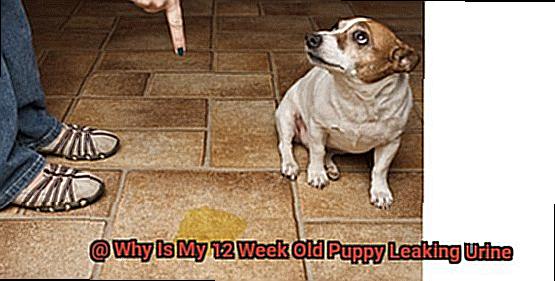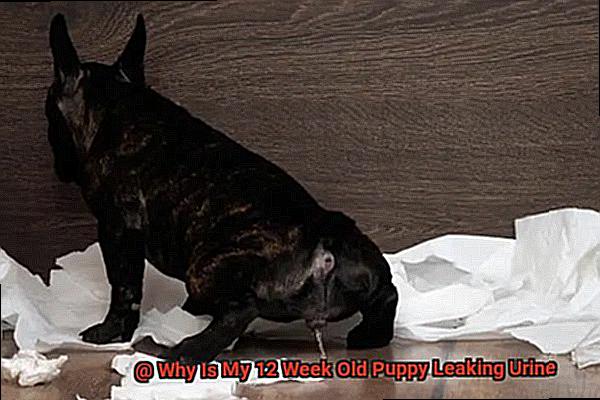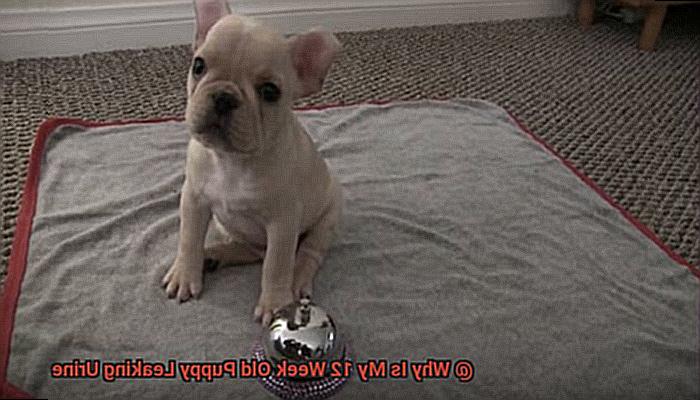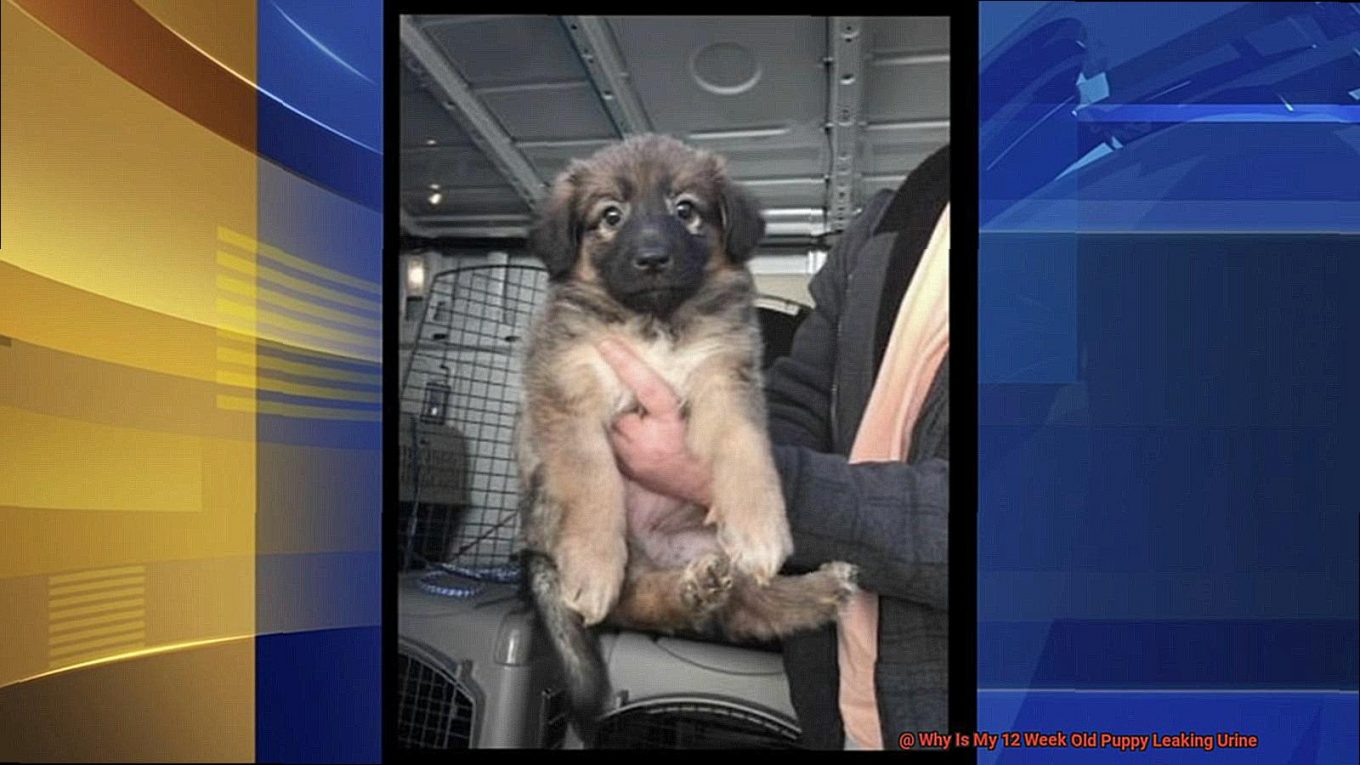Why Is My 12 Week Old Puppy Leaking Urine?
Is your 12-week old puppy leaking urine? This is a common concern among pet owners.
In this blog post, we’ll explore the potential reasons why your pup is leaking urine and what you can do to help them.
It could be due to urinary tract infections, bladder stones, or even kidney disease.
Stress, fear, or elation are all typical causes too.
Before addressing any behavioral aspect of the disorder, it’s important to rule out any medical conditions.
If there are no underlying medical conditions causing the leakage, you can take steps to help your pup.

Make sure they have plenty of exercise and mental stimulation during the day to reduce anxiety and fear.
Plus, provide access to fresh water at all times so they don’t become dehydrated.
Also, keep their environment as calm and consistent as possible – sudden changes can lead to anxiety which can worsen the issue.
This blog post will discuss why your 12 week old puppy is leaking urine and how you can help them handle it properly.
We’ll go over potential medical issues as well as tips for lowering anxiety levels and creating a peaceful environment for your pup.
What Causes Puppies to Leak Urine?
Contents
- 1 What Causes Puppies to Leak Urine?
- 2 Is It Normal for a Puppy to Drip Pee?
- 3 How Do I Stop My Puppy From Dribbling Urine?
- 4 How Can I Tell If My Puppy Has a UTI?
- 5 How Long Do Puppies Dribble Pee?
- 6 How Do I Know If My Puppy Has a Weak Bladder?
- 7 Treatment and Prevention of Urinary Incontinence in Dogs
- 8 Natural Remedies for Urinary Incontinence in Dogs
- 9 Conclusion
Puppy urinary incontinence is a common cause of leaking urine, but there are other potential factors that may be contributing to this issue.

Knowing the causes of puppy leakage can help owners resolve the issue and keep their pup happy and healthy.
A urinary tract infection (UTI) is one possible cause of puppy leakage.
These infections can cause inflammation and irritation in the bladder, making it difficult for puppies to maintain control over their bladder muscles.
Symptoms of a UTI include frequent urination, straining while urinating, and discomfort while urinating.
Stress can also be a factor in puppy leakage as it can lead to an increase in the production of certain hormones which can interfere with bladder control.
Panting, pacing, hiding or cowering away from people or other animals are all signs that your pup may be stressed.
In addition, diet can also play a role in puppy leakage as some foods may contain ingredients that are irritating to the bladder or that increase urine production.
It is important to ensure that your puppy’s diet contains all the necessary nutrients while avoiding foods that may irritate their bladder or increase urine production.
Puppies are like little sponges – they soak up everything around them – so it’s important to pay close attention to any changes in your dog’s behavior and identify any potential leakage sources quickly.
Is It Normal for a Puppy to Drip Pee?
Is it normal for a puppy to drip pee? The answer is yes. Puppies, like humans, have developing bladder control.
As they learn to control their bladders, it’s not uncommon for them to dribble urine occasionally.
When puppies are excited or nervous, their bladder control can slip away and they may leak a bit of pee.
Think of it as puppy stage fright – if your pup is meeting new people or going to the vet, they may be so overwhelmed that their bladder control slips away.
As long as it doesn’t happen too often or in large amounts, it’s nothing to worry about.
However, if your pup is dribbling urine frequently or in large amounts, it could be a sign of something more serious such as a urinary tract infection (UTI) or an anatomical issue such as an enlarged prostate or bladder stones.
In these cases, it’s important to take your puppy to the vet for an examination and treatment right away.
How Do I Stop My Puppy From Dribbling Urine?
Do you have a puppy that can’t seem to keep its bladder under control? If so, don’t worry – it’s normal for puppies to dribble urine, but if it’s excessive, it could be a sign of an underlying issue.
Fortunately, there are several things you can do to stop your puppy from dribbling urine.
To start, make sure your pup is getting enough exercise and has plenty of water throughout the day.
This will help strengthen their bladder muscles and improve their control over urination.
Additionally, take them outside often for potty breaks and reward them with treats when they successfully go in the right spot.
This will help teach them where they should go when they need to relieve themselves.
If these methods don’t seem to be helping, it may be time to consult with a veterinarian as there may be an underlying medical issue causing the problem, such as a urinary tract infection or weak bladder muscles.
How Can I Tell If My Puppy Has a UTI?
If you suspect your pup is suffering from a urinary tract infection (UTI), it’s important to act fast.
UTIs can be painful and cause discomfort for your dog, so it’s essential to know the symptoms and get them addressed as soon as possible.
Look out for signs like frequent urination, straining to urinate, bloody or cloudy urine, and painful urination.
If any of these symptoms present themselves, take your pup to the vet right away.
At the hospital, the vet will likely perform a physical exam and take a urine sample to test for bacteria or other signs of infection.

If your puppy does have a UTI, they will prescribe antibiotics to treat the infection.
It’s like giving your pup an armor of defense against the disease – make sure you follow the instructions carefully so that your puppy gets better quickly.
Think of it this way: antibiotics are like a magical shield for your pup if they were a knight in shining armor.
How Long Do Puppies Dribble Pee?
Puppies are like toddlers in many ways, including their inability to control their bladder muscles.
During the growth process, puppies will often experience dribbling urine until they reach 12-16 weeks old.
While this is a normal part of puppy development, it’s important to monitor your pup’s peeing habits in case excessive dribbling indicates a medical condition.

The amount of urine leakage can vary from pup to pup and be influenced by the size of the bladder, how much water they consume, and any underlying medical conditions.
As puppies learn to control their bladder muscles better, they will dribble less and less over time – similar to a potter at her wheel as she molds her clay into a stunning work of art.
How Do I Know If My Puppy Has a Weak Bladder?
This is a common issue for puppies due to their small size and immature urinary systems.
It’s important to pay attention to the signs so that you can get your pup the help it needs.
Signs of a weak bladder in puppies can include frequent urination, leaking urine, difficulty controlling the bladder, excessive licking of the genital area, straining to urinate, or discomfort when urinating.
If you notice any of these symptoms in your pup, it’s time to take them to the vet for diagnosis and treatment.
At the vet, they’ll be able to determine whether there is an underlying medical condition causing the problem or if it is simply a normal part of puppy development.
Treatment options may include medication, dietary changes, or behavioral modification techniques such as crate training or toilet training.
Treatment and Prevention of Urinary Incontinence in Dogs
Urinary incontinence can be a distressing and difficult condition for dogs.
Fortunately, there are various treatments available to help your pup manage their bladder control.
Medication, dietary changes, bladder support supplements and even surgery are all treatment options for urinary incontinence in dogs.
Prevention is the best option when it comes to puppies suffering from urinary incontinence.
Ensuring that your puppy gets enough exercise and avoiding activities which put too much strain on their bladder muscles, such as jumping or running up stairs or playing rough games with other puppies or adults, can help prevent incontinence issues in the future.
In addition, adding fiber to their diet to increase bulk and reduce urine output and switching them to a low-salt diet that is high in water content can also help keep their bladder clean.
Having a solid foundation of understanding when it comes to managing your dog’s urinary incontinence is essential for ensuring they stay healthy and happy.
Natural Remedies for Urinary Incontinence in Dogs
Our furry friends can suffer from urinary incontinence just like us, but luckily there are natural remedies to help keep their bladders healthy and minimize leakage.
Herbal supplements such as cranberry extract, dandelion root, and marshmallow root can be beneficial for dogs with bladder issues.
Probiotics can also promote gut health and reduce inflammation in the bladder.
Omega-3 fatty acids found in fish oil are known to reduce inflammation and improve bladder health.
Vitamin B6 has been proven to reduce bladder spasms and improve urinary tract health.
Exercise is key in keeping your pup’s bladder strong; it strengthens the pelvic floor muscles which helps with urine control.
And of course, providing plenty of fresh water will help keep their urine diluted, reducing the risk of any embarrassing accidents.
Conclusion
Puppy urinary incontinence is a common issue for pet owners.
Knowing the causes, medications, and prevention steps can help keep your pup healthy and happy.
Potential causes include urinary tract infections, bladder stones, kidney disease, anxiety, or elation.
To reduce anxiety levels, provide plenty of exercise and mental stimulation throughout the day.
Keep their environment as calm and consistent as possible, with access to fresh water at all times.
If you suspect your dog has a UTI or poor bladder health, seek veterinary attention immediately for examination and treatment.
Medication, dietary changes, or behaviour change strategies such as crate training or toilet training may be included in treatment options.
Natural remedies can also help with urinary incontinence in dogs – try cranberry extract or marshmallow root; probiotics; omega-3 fatty acids present in fish oil; and regular exercise.




